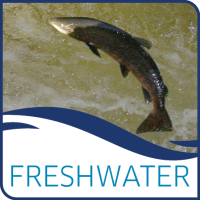The Girnock and Baddoch catchments are long-term monitoring sites where the population dynamics of spring salmon have been assessed since 1966 and 1988 respectively. These sites include a pair of fixed traps designed to catch returning adult salmon and descending juvenile emigrants. The descending traps are whole river traps based on a modified Wolf trap, and operate on permanent weirs. They are routinely operated in both autumn and spring, providing counts of emigrant salmon. Trap protocols have been similar, although not identical, over this long period.
Data and Resources
- Girnock and Baddoch: Emigrants Numbers by Year of Emigrationcsv
The columns in the file are:
Preview Download
Year – Year that fish were caught in the...
| Field | Value |
|---|---|
| Publisher | |
| Modified | 2026-01-28 |
| Release Date | 2015-03-20 |
| Frequency | Annually |
| Identifier | 1d1d693e-eb8d-4bb4-b70b-442ca33c6c58 |
| Spatial / Geographical Coverage Area | POLYGON ((-4.0017700195313 56.998555402976, -4.0017700195313 57.480095735105, -2.8555296733975 57.480095735105, -2.8555296733975 56.998555402976)) |
| Spatial / Geographical Coverage Location | Girnock and Baddoch catchments, Scotland |
| Temporal Coverage | 1966-01-01 |
| Language | English (United Kingdom) |
| License | UK Open Government Licence (OGL) |
| Granularity | Annual |
| Author | |
| Data Dictionary | Juvenile salmon are caught in the descending emigrant traps at the Girnock and Baddoch Burns in autumn and spring. Salmon are considered to be smolts if they emigrate between the 1st of January and the 31st of May, and autumn parr if they leave between the 1st of September and the 31st of December. Counts of juvenile salmon are presented by year of capture in the trap. Data were collated from historic trap books and paper files from 1966 to 1989, and were recorded electronically from 1990 to present. All data were imported into a central Marine Scotland Science database (FishObs). The smolt data at the Girnock and Baddoch are considered to be robust and have been collected in a similar way, with a similar level of effort over the monitoring period. Counts of autumn emigrants were affected by low trap effort at the Girnock in a few years in the 1980s. Counts from some of these years have been corrected for effort (see Bacon et al. for details), other years were affected by such low effort that they are considered unusable and have been removed from the dataset. For full details of the data and the correction process, see: |
| Contact Name | Marine Directorate Enquiries |
| Contact Email | |
| Public Access Level | Public |


